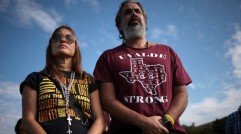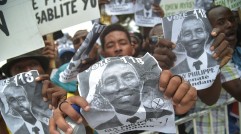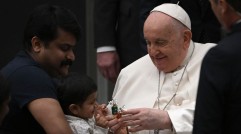Former President Clinton's Charity Leads Ebola Aid Effort to Africa
As a chartered 747 jet departed New York Saturday with the largest single shipment so far of aid for the zone in Africa ravaged by the deadly Ebola virus, former President Bill Clinton said it was a "good beginning."
A day before his Clinton Global Initiate charity was to kick off its 10th annual meeting in the Big Apple, Clinton acknowledged during a conference call with reporters that "We're still a little behind the curve but we're getting there," according to a report by Reuters.
Coordinated by the CGI and other aid organizations from the United States, the supply flight lifted off from John F. Kennedy International Airport bound for West Africa, where Ebola has been spreading exponentially, .
"We're going to have to do whatever it takes to contain the epidemic," Clinton said, noting new initiatives from the U.S., Britain, France and other countries to help fight the epidemic.
"It's a sprawling, growing thing. But at least they're putting the infrastructure in and have shown a willingness to put some money behind it," he said in the Reuters piece.
Government officials and local aid workers are expected to receive the shipment of 170 pallets of gloves, gowns and other protective equipment for medical providers -- which will then be distributed to about 200 healthcare facilities on Monday, Thomas Tighe, chief executive of the California-based aid group Direct Relief, which collected the 100 tons of emergency medical aid, told Reuters.
In a brief ceremony before the 747 taxied down the runway at JFK, Augustine Kpehe Ngafuan, Liberia's minister of foreign affairs, announced the aid shipment "will translate into saving lives ... We have been able to place men on the moon. Let us do a similar thing for mankind. I appeal to the international community."
Since the outbreak was detected in March, Ebola has infected at least 5,357 people, mostly in Guinea, Sierra Leone and Liberia, and killed an estimated 2,630, according to the World Health Organization, the Reuters report said.
President Barack Obama recently announced the U.S. would send 3,000 troops to West Africa, including a major deployment in Liberia, to help manage the outbreak.
Subscribe to Latin Post!
Sign up for our free newsletter for the Latest coverage!
* This is a contributed article and this content does not necessarily represent the views of latinpost.com













